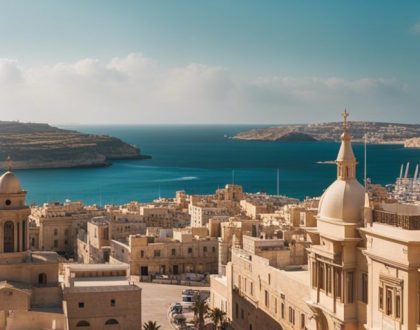Navigating Personal Finance in Malta

Understanding how to navigate personal finance in Malta is essential for both residents and expats. With its unique tax laws, banking system, and investment opportunities, Malta offers a plethora of options for managing your money. However, it’s important to be aware of the potential pitfalls and take advantage of the benefits that come with managing your personal finances in this Mediterranean island nation.
Banking and Savings
As an expat or a local in Malta, it’s essential to understand the banking system and options available for saving and managing your finances. Choosing the right bank and savings accounts can significantly impact your financial health and goals.
Choosing the Right Bank in Malta
Banking in Malta offers a variety of options, ranging from international banks to local institutions. When selecting a bank, consider factors such as fees, customer service, online banking capabilities, and accessibility of ATMs and branches. It’s also crucial to consider the stability of the bank and its reputation within the country. Research the different banks available in Malta and compare their services to find the right fit for your financial needs and lifestyle.
Savings Accounts and Interest Rates
Rates for savings accounts in Malta can vary among different banks, and it’s essential to compare the interest rates offered. Some banks may provide higher interest rates for long-term deposits, while others offer competitive rates for regular savings accounts. Additionally, consider the fees associated with these accounts, including maintenance fees and withdrawal charges.
Banking institutions in Malta also offer various types of savings accounts, such as fixed term deposits, instant access accounts, and children’s savings accounts. It’s important to assess your financial goals and personal circumstances to choose an account that aligns with your needs and offers the best returns on your savings.
Investing in Malta
One of the key components of personal finance is investing. Whether you are looking to grow your wealth or save for retirement, investing wisely is crucial. In the context of Malta, there are various options available for individuals looking to invest their money.
Stock Market Basics for Maltese Investors
Malta has a relatively small, but vibrant stock market that provides opportunities for investors to participate in the growth of local and international companies. Maltese investors can access the stock market through brokerage firms and online trading platforms. It’s essential for investors to conduct thorough research and seek professional advice before diving into stock market investments. Understanding market trends, company fundamentals, and risk management are key aspects for success in the stock market.
Real Estate Investments: Opportunities and Risks
Malta’s real estate market has been witnessing significant growth in recent years, making it an attractive option for investors. The demand for property, particularly in the commercial and residential sectors, has created opportunities for investors to earn rental income and benefit from capital appreciation. However, it’s crucial for investors to be aware of the risks associated with real estate investments, such as market volatility, liquidity challenges, and regulatory changes. Conducting thorough due diligence and seeking professional guidance can help investors make informed decisions in the real estate market.
Plus, investing in real estate offers the potential for long-term wealth accumulation, diversification of investment portfolios, and tax advantages through property ownership.
Taxation and Retirement Planning
For individuals looking to secure their financial future in Malta, understanding the taxation system and setting up a robust retirement plan is crucial. This chapter will cover the ins and outs of navigating personal finance in Malta, focusing on taxation and retirement planning.
Understanding Malta’s Tax System for Personal Finance
Understanding Malta’s tax system is essential for effective personal finance management. Malta operates a progressive tax system, with tax rates ranging from 15% to 35% based on income levels. The tax year runs from January 1st to December 31st, and individuals are required to file an annual tax return. There are various tax deductions and incentives available, including tax credits for donations to approved organizations and tax rebates for eco-friendly initiatives. It’s important to stay updated with the latest tax regulations and seek professional advice to maximize tax efficiency and compliance.
Retirement Savings Plans and Pensions
With an aging population and increasing life expectancy, retirement planning is a critical aspect of personal finance. In Malta, individuals can contribute to Personal Retirement Savings Plans (PRSPs) or Occupational Retirement Schemes (ORSs) to build a sustainable retirement fund. Contributions to PRSPs and ORSs are tax-deductible, offering immediate tax relief. Furthermore, individuals can benefit from tax-exempt withdrawals upon reaching retirement age. It’s imperative to start contributing to a retirement plan early and regularly to ensure a comfortable retirement lifestyle.
System Additionally, Malta offers a voluntary private pension system for those who wish to supplement their state pension. This provides individuals with flexibility and control over their retirement savings, empowering them to make informed decisions based on their financial goals and circumstances.
Managing Debt and Credit
To effectively manage your personal finances in Malta, it is essential to understand the principles of managing debt and credit. Whether it’s credit cards, loans, or mortgages, having a solid understanding of how to responsibly utilize credit is crucial in maintaining financial stability and achieving your long-term financial goals.
Credit Cards and Loans: Managing Debt Wisely
One of the keys to managing debt wisely in Malta is being mindful of your spending and borrowing habits. On the one hand, credit cards offer convenience and flexibility, but they can also lead to reckless spending and high-interest debt if not managed responsibly. Similarly, loans can provide necessary funds for large purchases or investments, but they can also become burdensome if not carefully considered and planned for.
On the other hand, it is important to establish a clear repayment strategy and to avoid accumulating high-interest debt unnecessarily. Prioritizing debt repayment and keeping credit utilization low are crucial habits for managing debt wisely and maintaining a healthy financial profile.
Strategies for Improving Your Credit Score in Malta
Improving your credit score in Malta is vital for accessing favorable loan terms and financial opportunities. To achieve this, it is essential to consistently and responsibly use credit, make timely payments, and keep credit utilization low. Additionally, monitoring your credit report regularly and addressing any discrepancies or issues promptly can help safeguard your credit score and financial well-being.
Score your credit health in Malta significantly impacts your ability to secure loans, mortgages, and other financial products. By implementing positive credit habits and utilizing effective strategies, you can work towards improving your credit score and unlocking a myriad of financial opportunities in Malta.
Conclusion
Considering all points, navigating personal finance in Malta requires a thorough understanding of the country’s financial regulations and practices. From managing day-to-day expenses to planning for retirement, individuals in Malta must be proactive in seeking out financial education and resources. By staying informed about tax laws, savings options, and investment opportunities, individuals can make sound financial decisions and secure their future. With the right knowledge and guidance, navigating personal finance in Malta can be manageable and rewarding.
FAQs:
What factors should I consider when choosing a bank in Malta?
Consider fees, customer service, online banking capabilities, ATM accessibility, and the stability and reputation of the bank.
What types of savings accounts are available in Malta, and how do they differ?
Malta offers various accounts like fixed term deposits, instant access accounts, and children’s savings accounts. Differences lie in terms, interest rates, and associated fees.
How can Maltese investors access the stock market, and what should they consider before investing?
Investors can access Malta’s stock market through brokerage firms and online platforms. Thorough research, understanding market trends, and professional advice are crucial before investing.
What are the key aspects of Malta’s tax system, and how can individuals maximize tax efficiency?
Malta operates a progressive tax system (15%-35%). Understanding tax credits, deductions, and staying updated with regulations can help maximize efficiency.
What retirement plans are available in Malta, and how can individuals ensure a comfortable retirement?
Individuals can contribute to PRSPs or ORSs for a sustainable retirement fund with tax benefits. Malta’s voluntary private pension system offers flexibility for supplementing state pensions.
Recommended Posts

Malta’s Coastal Drives for Road Trippers
May 17, 2024

Overview of Business Finance in Malta
May 17, 2024

Malta’s iGaming Frontier – Best Brands
May 17, 2024




